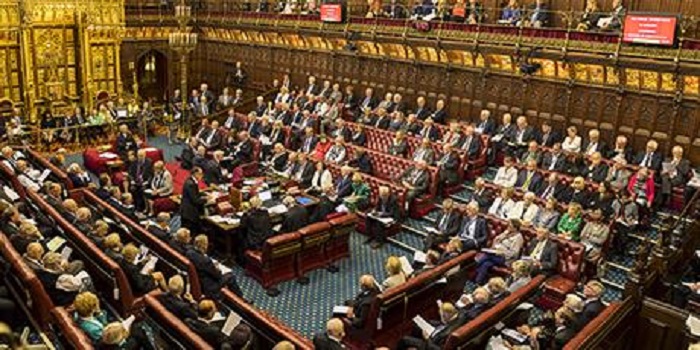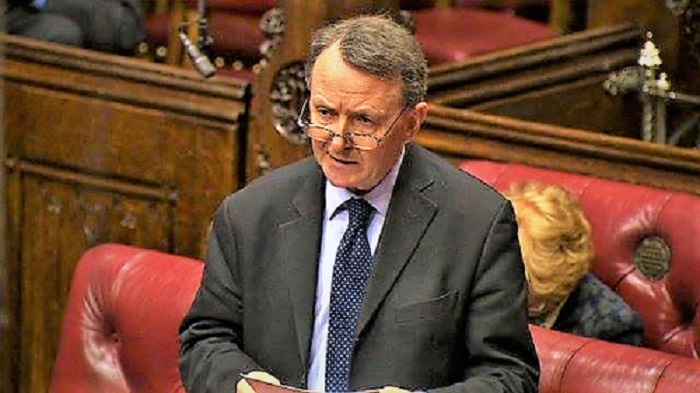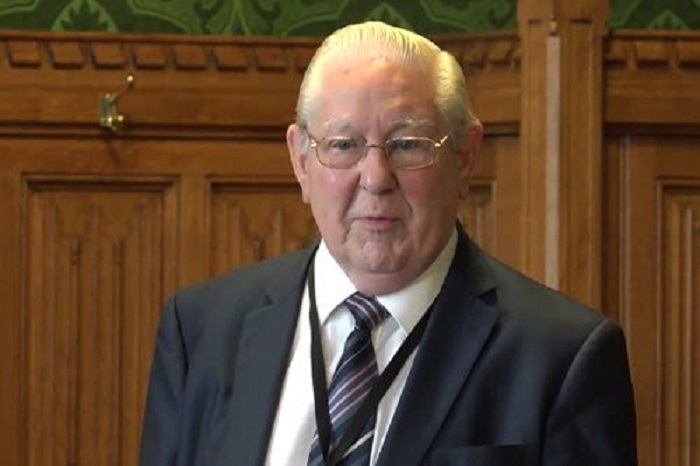
British’s UK House of Lords
Members of the British House of Lords, the U.K.’s upper chamber in Parliament, debated the recent events in Iran in a sitting on January 30th earlier this year. Several lawmakers referred to the activities of the Iranian regime as “destabilizing” and reminiscent of the events in the U.S.S.R immediately after the Chernobyl nuclear disaster.
Lord Alton, of Liverpool, referred to the recent shooting down of the Ukrainian Airlines plane on January 3rd by the Iranian IRGC, with the loss of 176 lives, and said that the event may have been Iran’s “Chernobyl moment.” This was “a moment when another fundamentally flawed regime is exposed for what it is. The conflation of lies, denials, and distortions, accompanied by bulldozers trying to plow up the evidence, was a vivid demonstration of the nature of a cruel and barbaric regime, unworthy of a great people and a great country,” he said.

Lord Alton, of Liverpool
According to Lord Alton, the protests held in Iran last November and the repression that followed was the Iranian regime’s “greatest existential crisis” since the Iranian Revolution in 1979. Lord Alton commented that the regime was responding to the crisis by killing and terrorizing thousands of its own citizens. “(Ayatollah) Khamanei and Soleimani are two sides of the same coin,” he said.
Lord Alton posed a question to the British Minister of State. He asked the Minister whether he had a response to a report in the British daily, The DailyTelegraph, about a secret Iranian military campaign involving the now deceased Soleimani’s Quds forces and Afghani mercenaries in the North-Western city of Idlib in Syria. There had been a promise in peace talks not to continue attacks in that city, the report had added.
Lord Clarke of Hampstead referred to the ongoing oppression in Iran. “The recent protests have led to an all-too-familiar pattern of murders and mass arrests. Innocent people who have only freedom in mind—freedom for democracy—are being cruelly mown down,” he said. He paid tribute to the protesters who in his opinion were trying to bring about changes in their own country.

Lord Clarke of Hampstead
Lord Clarke reminded members of the House of Lords about past activities of President Hassan Rouhani. He said that he hoped that the Minister was able to speak up more clearly about what was happening n Iran than had occurred in recent times. He mentioned past atrocities such as the massacre of 30,000 political prisoners in 1988, mostly supporters and members of the Mujahedin-e Khalq (PMOI/MEK Iran)
“This is the Rouhani from the 1988 massacre; the Rouhani who told Iraq what to do about the people at [Camp] Ashraf and Camp Liberty. More recently, Iran’s fingers have got involved in Albania, where some of those people resettled after getting out of Camp Liberty,” he said.
The former European Union High Representative, Baroness Ashton of Upholland, said that one of the criticisms of the 2015 nuclear deal with the Iranian regime was that it only dealt with nuclear issues and not wider issues within Iran.
The U.K. Minister of State, Foreign and Commonwealth Office, Lord Ahmad of Wimbledon, in his capacity as a representative of the British government, aid that the world must take into account the fact that the Iranian regime was a “destabilizing” influence in the region.

Lord Ahmad of Wimbledon
Lord Ahmad specifically referred to the attacks by the regime’s forces on Gulf shipping. He stated that the U.K. government understood the shift in policy by the U.S. government in favor of increasing deterrence against Iran by making it more costly for Iran to continue its malign activities.
In response to Lord Alton’s question, he said that in his role as Human Rights Minister he assured him that the issue of human rights in Iran would be continued to be raised. “It is worrying for someone who looks after the agenda of women, peace, and security to see the declining role of women within Iran and the suppression of women’s rights,” he said.
The Minister concluded the debate by reiterating that the British government would continue to hold Iran to account for its destabilizing actions within the region.
